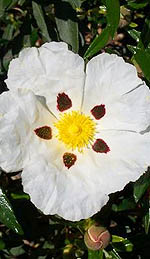 Labdanum is one of those shrubs that makes ancient history a truly intriguing tale. Mediterranean sheep and goat herders were the first group to figure out what to do with the sticky resin from the bushes. They collected the resin by combing the thighs and beards of goats that grazed on the cistus shrubs. They developed wooden rakes with a double row of wooden thongs to sweep the shrubs so the resin could be collected and then extracted.
Labdanum is one of those shrubs that makes ancient history a truly intriguing tale. Mediterranean sheep and goat herders were the first group to figure out what to do with the sticky resin from the bushes. They collected the resin by combing the thighs and beards of goats that grazed on the cistus shrubs. They developed wooden rakes with a double row of wooden thongs to sweep the shrubs so the resin could be collected and then extracted.
The pharaohs were the first group to use labdanum on the body. Most of them wore goat hair beards, which were attached to the face with labdanum. The resin was also used to treat rheumatism, colds, and menstrual problems. Some biblical scholars believe that the holy incense mentioned in the Bible (Ketoret) was actually labdanum.
The labdanum oil used in aromatherapy is actually a product of steam distilling the leaves and branches of the shrubs. Labdanum’s aroma is described as sweet, woody, and leathery with a dry musk as well as an amber scent. The perfume industry uses labdanum because it displays a variety of scents that can be enhanced in the perfume-making process.
Most essential oils have antiseptic, antimicrobial, astringent, expectorant, balsamic, antitussive, emmenagogue, and tonic properties and labdanum is no different. The oil is used to treat diarrhea, dysentery, skin conditions, tumors, and arthritis and blends well with clary sage, pine, juniper berry, cypress, lavender, bergamot, sandalwood, and chamomile oil. The oil can be massaged into the skin or diluted in a bath to relieve coughs, colds, and scrofulous skin issues.
The main use for labdanum is to relax the nerves, ease stress, and promote a calm presence. When the thick labdanum oil is warm it is reputed to have the ability to change thoughts, which move emotions back from the brink of negativity, and into the light of connected control.
The oil will loosen tight muscles, and improve circulation; it carries more oxygen to the organs and the brain. When stress stretches the nervous system to the point of depression or when the emotions teeter on the brink of a hormonal overload, labdanum will interact with the adrenal glands and begin to balance hormone secretion.
Loyal labdanum users like to combine meditation with a few drops of the oil in order to reach a state of relaxation, often with other essential oils such as frankincense to deepen the breath or patchouli for its cherished grounding effects. That process helps neural impulses return to their normal state, and allows emotions and energies to flow freely and beneficially.
Labdanum oil is considered a mood enhancer that will bring the body and the mind together so the nervous as well as the circulatory, respiratory, and intestinal systems work efficiently. The ancients knew it was an oil fit for royalty, and now we are coming to recognize that once more.
